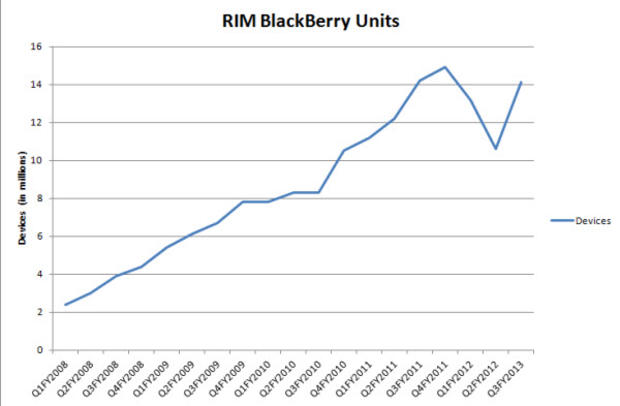Whither, RIM? Looks like nowhere but down
COMMENTARY Research in Motion (RIMM) has become such a home of bad news, anything positive would seem greatly encouraging. But the bright side was dim.
In its earnings announcement for the third quarter that ended in November, RIM reported $5.2 billion in revenue, up 24 percent from the previous quarter, but down 6 percent year over year. BlackBerry shipments of 14.1 million were up from the catastrophic previous quarter but still down year-over-year. And the outlook for next quarter is dimmer: revenue between $4.6 and $4.9, and BlackBerry shipments of between 11 million and 12 million units. Even now the stock is plummeting.
Companies never have an easy time when they crash. It's tougher when they were once the leader in a field. That's the difficulty facing RIM. It went from being the definitive word in work-oriented smartphones to a headline maker when drunk executives forced a plan to land in the middle of a flight to China -- and actually chewed their way out of restraints that the flight crew had applied.
Kodak, Yahoo and RIM: Death comes for us all
RIM is King Lear: Self-Blinded and Waiting for Death
RIM writes off value of tablet inventory
Falling sales
Unfortunately for RIM, that sort of bad PR is a distraction compared to the fundamental, significant, and dire issues it faces. Unit sales were up from last quarter, but still lower than a year ago. As the chart below shows, this is going-off-a-cliff territory while Apple (AAPL) iPhones and handsets running Google (GOOG) Android keep their steep growth curve.
With the 11 million to 12 million unit guidance for next quarter, you can see where the graph will head.
Virtually everything the company has done to address its previous lackadaisical attitude toward the growth of consumer-oriented phones has been for naught. The PlayBook tablet, which was supposed to be a game changer, went nowhere but into heavy discounting to move units. RIM wrote down $485 million to account for the declining value of the inventory.
RIM tried to reduce costs with a high-profile layoff of 2000 employees in July. But a little probing into the numbers and the rate of employee growth showed that it was only reducing to the staffing level it had in February 2011, and that it would likely continue to expand again.
The next version of the BlackBerry operating system has faced multiple delays and is expected to ship sometime next year. [Update: Make that the "latter part" of next year.] To add insult to injury, RIM lost a trademark battle against a small software company and so won't be able to call the product BBX as it wanted. Instead, the new OS will be called BlackBerry 10. So much for setting a new tone going forward. The name says that RIM will be more of the same as it has always been. Which is to say, way too much.
Some employees appear to have lost confidence in management. They joined the many investors who have called for a management turnover. But co-CEOs Mike Lazaridis and Jim Balsillie have made it clear that they don't think anyone else could do a better job of running the company. As the release said, " It may take some time to realize the benefits of these efforts and the platform transition that we are undertaking, but we continue to believe that RIM has the right set of strengths and capabilities to maintain a leading role in the mobile communications industry." Leading role? Have either of these two realized that it's about to be 2012, not 2004?
Given what they've done, it may now be too late for new leadership to make a difference. There comes a point at which, for whatever commercial or cosmic reason, it's almost impossible to recover without massive change that neither Lazaridis or Balsillie has recognized as necessary.
What can the company do? The abysmal PlayBook sales have scared off potential acquirers. One major investor is saying sell off parts of the business. The one thing that seems increasingly more certain is a sad end to a once-important company.

